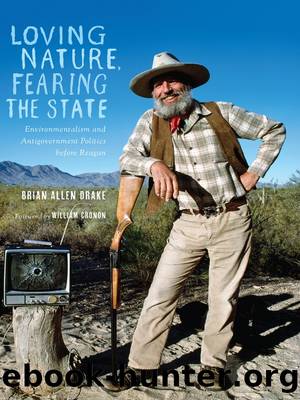Loving Nature, Fearing the State by Brian Allen Drake

Author:Brian Allen Drake [Drake, Brian Allen]
Language: eng
Format: epub
Tags: History, Modern, 20th Century, Technology & Engineering, Agriculture, Forestry
ISBN: 9780295804859
Google: pchLAgAAQBAJ
Publisher: University of Washington Press
Published: 2013-12-19T04:12:25+00:00
With Anderson and Leal's book the free-market approach broke out of its small circle of champions and caught the attention of mainstream environmentalism. Recent policy developments gave free-marketers some reason to believe that their ideas might catch on. As early as the mid-1970s, the Environmental Protection Agency had adopted a tradable-permit approach to phasing out leaded gasoline, a result of its recognition of the economic burdens inherent in its regulatory approach. In the 1980s the Montreal Protocol on Substances That Deplete the Ozone Layer used a permit scheme to eliminate ozone-depleting CFCs, and the Clean Air Act of 1990 used permits to reduce acid rainâinducing sulfur emissions from coal plants. Some of the movement's champions had even gained the ear of powerful people in Washington, D.C. Interior Secretary James Watt, for example, tapped Richard Stroup as an adviser in the early days of the Reagan administration. Perhaps the best evidence of free-market environmentalism's coming out was the interest of outsiders, some of whom saw much to admire and others who dismissed it as âsnake oil.â29
Some of the strongest criticisms came from legal specialists, who took exception to what they considered the superficial and naïve invocation of common law and âenvironmentalism by tort.â Such an approach, they argued, would require a massive increase in legal structureâmore courts, lawyers, judges, experts, and so onâwhich, at the very least, would clash with the free-market mission to maximize efficiency and minimize bureaucracy and at worst create an endless nightmare of private lawsuits for every conceivable violation of environmental property rights. Furthermore, financial costs would likely be prohibitive for less affluent plaintiffs, and class action suits no guarantee of getting around the problem. Most industrial polluters would be able to hire more and better lawyers and experts who would only need to show reasonable doubt to emerge victorious. Powerful polluters might also pressure government into defining ârightsâ and âharmâ in their favor, similar to the ways in which business interests lean on regulatory agencies to place their interests first. In the end, many lawyers, sensing the difficulties, would likely refuse to take on an environmental tort case at all, and, as law professor Edward Brunet noted, âfor numerous private-property holders, the concept of âfree marketâ enforcement so zealously advocated [by free-marketers] is, in reality, no enforcement at all.â30
Other critics, including not only lawyers but environmental activists and ecological economists, expanded the critique. Even free-market approaches with a proven track record like cap-and-trade, they argued, presented difficulties. First, there was the question of initial allocation: who would get allowances at the beginning of any trading scheme, and how many would they get? Experience in the 1970s and 1980s had resulted in some tweaking of later programs, but problems remained. Second, who would set the âcapâ under which future programs would take place? Free-market advocates often argued that the cap should be set by bargaining among traders themselves and not by government regulators; critics countered that this would eliminate input from ecologists and biologists with a far better understanding of what constituted an environmentally safe capping level.
Download
This site does not store any files on its server. We only index and link to content provided by other sites. Please contact the content providers to delete copyright contents if any and email us, we'll remove relevant links or contents immediately.
International Integration of the Brazilian Economy by Elias C. Grivoyannis(111059)
The Radium Girls by Kate Moore(12029)
Turbulence by E. J. Noyes(8051)
Nudge - Improving Decisions about Health, Wealth, and Happiness by Thaler Sunstein(7709)
The Black Swan by Nassim Nicholas Taleb(7130)
Rich Dad Poor Dad by Robert T. Kiyosaki(6633)
Pioneering Portfolio Management by David F. Swensen(6301)
Man-made Catastrophes and Risk Information Concealment by Dmitry Chernov & Didier Sornette(6019)
Zero to One by Peter Thiel(5802)
Secrecy World by Jake Bernstein(4753)
Millionaire: The Philanderer, Gambler, and Duelist Who Invented Modern Finance by Janet Gleeson(4478)
The Age of Surveillance Capitalism by Shoshana Zuboff(4293)
Skin in the Game by Nassim Nicholas Taleb(4250)
The Money Culture by Michael Lewis(4207)
Bullshit Jobs by David Graeber(4192)
Skin in the Game: Hidden Asymmetries in Daily Life by Nassim Nicholas Taleb(4007)
The Dhandho Investor by Mohnish Pabrai(3766)
The Wisdom of Finance by Mihir Desai(3748)
Blockchain Basics by Daniel Drescher(3583)
